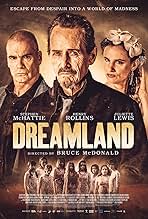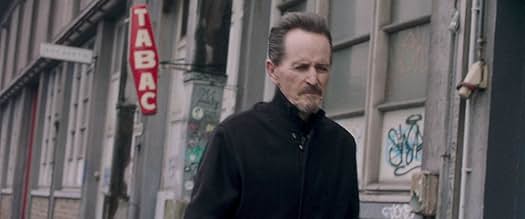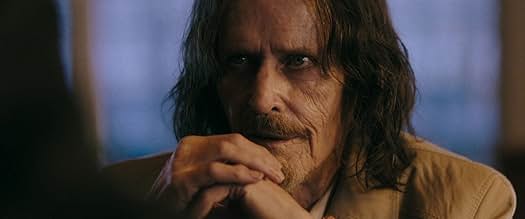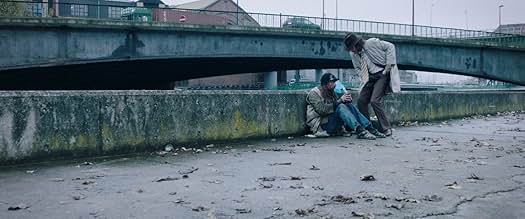La notte del matrimonio più strano della storia del cinema, quando un grottesco boss di una gang, assume un freddo assassino per portargli il dito di una leggenda del jazz in dissolvenza e d... Leggi tuttoLa notte del matrimonio più strano della storia del cinema, quando un grottesco boss di una gang, assume un freddo assassino per portargli il dito di una leggenda del jazz in dissolvenza e drogata.La notte del matrimonio più strano della storia del cinema, quando un grottesco boss di una gang, assume un freddo assassino per portargli il dito di una leggenda del jazz in dissolvenza e drogata.
- Regia
- Sceneggiatura
- Star
Recensioni in evidenza
25% of this movie is a closeup of Stephen McHattie's face while he murmurs about something unimportant, slowly.
In 2008, Bruce McDonald released 'Pontypool', a tense, darkly funny adaptation of Tony Burgess's novel 'Pontypool Changes Everything.' A fresh take on a stale genre- the zombie film- starring Stephen McHattie and Lisa Houle, it was a critical and commercial success. For years, McDonald planned on making a spin-off, featuring two characters- again played by McHattie and Houle- who appear after the end credits. A film he would later admit in an interview with Trouble City he "never really believed that we might shoot... because it seemed so crazy."
Shoot it they did, and crazy it is. 'Dreamland' follows laconic hitman Johnny Deadeyes, who is hired by Hercules, a nightclub owning pimp, to find a famous, faded jazz musician and cut off his finger. Meanwhile, an associate of Hercules's known as the Countess is organising a wedding reception for her brother, who happens to be a vampire with a taste for young blood. As Deadeyes embarks on his quest, he begins to examine his life; deciding to break out of the darkness that surrounds him.
It's a very strange affair, feeling at times like five different films spliced into one. The narrative veers this way and that, touching upon some interesting themes, but rarely exploring them beyond the surface level. The theme of redemption is central to Deadeyes' journey, as he grapples with the consequences of his violent past while seeking a path to atonement. However, this idea has been explored ad infinitum, and while McDonald doesn't have many fresh ideas on that point, rarely do those stories feature vampires and seedy covers of Eurythmics songs.
Meanwhile, human trafficking and exploitation are presented as stark realities that contrast with the film's more fantastical aspects, grounding the narrative in a grim social commentary; which, unfortunately, feels a bit ham-fisted and cursory. Despite that, McDonald successfully blurs the lines between reality and fantasy, mirroring Deadeyes' quest for purpose in a world lacking clear moral direction.
However, McDonald- and screenwriters Tony Burgess and Patrick Whistler- imbue the narrative with too many subplots and side characters, diluting Johnny Deadeyes' central quest for moral vindication. The addition of a child trafficking ring, as well as the aforementioned vampiric nuptials, distract rather than engage, and aren't well realised. McDonald doesn't delve into the complexities of these ideas, nor does the black comedy land consistently.
Conversely, the film is a visual delight. It is easy to compare to the works of David Lynch, as the velvet curtained, strangely lit world Deadeyes navigates harkens back to places explored by Jeffery Beaumont in 'Blue Velvet' or Nikki Grace in 'Inland Empire.' Eugénie Collet's production design is indeed Lynchian in nature, while Richard Van Oosterhout's unconventional cinematography compounds the strangeness of the narrative.
Van Oosterhout fosters a neo-noir atmosphere, and his work adds to the dreamlike quality of the film, creating a sense of disorientation aligning with Deadeyes' journey through the bizarre underworld. His employment of stark contrasts and shadows not only contributes to the film's noiresque atmosphere but also underscores the thematic contrasts between light and dark, reality and fantasy.
On the other hand, Jonathan Goldsmith's original score dominates every scene. Often, dialogue is obscured by his discordant melodies, and, while it does compound the film's atmosphere, it also distracts and irritates. Having said that, his interpretation of Eurythmics 'I Saved The World Today'- played over a slow-motion scene of violence- is both clever and powerful; although McDonald and editor Duff Smith are probably more deserving of praise in this regard.
Stephen McHattie stars as Johnny Deadeyes and the jazz musician, opposite Henry Rollins as Hercules and Juliette Lewis as the Countess. The always reliable McHattie's dual performances as Deadeyes and the jazz musician are a testament to his acting prowess. As the hitman, he exudes a weary stoicism, his eyes reflecting a history of violence and regret. In contrast, his portrayal of the jazz musician is imbued with a melancholic nostalgia, his every gesture suggesting a fall from grace.
Rollins, meanwhile, brings a menacing charisma to the role of Hercules, embodying the character with a predatory grace making him a formidable presence on screen. His performance adds a layer of unpredictability to the film's already eclectic atmosphere. Lewis seems hell-bent on chewing as much scenery as she can, though, in a way, captures the complexity of a character who is at once seductive and dangerous, further enriching the film's tapestry of dark and intriguing figures.
Although rather uneven and lumbered with too many subplots and side characters, Bruce McDonald's 'Dreamland' is worth a watch, especially for fans of Stephen McHattie. A strange trip into a dark underworld, the narrative engages as well as disappoints; but is never uninteresting. The production design and cinematography are striking and bizarre, even while the score is rather over-the-top. However, Stephen McHattie is brilliant, ensuring that, despite its issues, 'Dreamland' is not a nightmare.
Shoot it they did, and crazy it is. 'Dreamland' follows laconic hitman Johnny Deadeyes, who is hired by Hercules, a nightclub owning pimp, to find a famous, faded jazz musician and cut off his finger. Meanwhile, an associate of Hercules's known as the Countess is organising a wedding reception for her brother, who happens to be a vampire with a taste for young blood. As Deadeyes embarks on his quest, he begins to examine his life; deciding to break out of the darkness that surrounds him.
It's a very strange affair, feeling at times like five different films spliced into one. The narrative veers this way and that, touching upon some interesting themes, but rarely exploring them beyond the surface level. The theme of redemption is central to Deadeyes' journey, as he grapples with the consequences of his violent past while seeking a path to atonement. However, this idea has been explored ad infinitum, and while McDonald doesn't have many fresh ideas on that point, rarely do those stories feature vampires and seedy covers of Eurythmics songs.
Meanwhile, human trafficking and exploitation are presented as stark realities that contrast with the film's more fantastical aspects, grounding the narrative in a grim social commentary; which, unfortunately, feels a bit ham-fisted and cursory. Despite that, McDonald successfully blurs the lines between reality and fantasy, mirroring Deadeyes' quest for purpose in a world lacking clear moral direction.
However, McDonald- and screenwriters Tony Burgess and Patrick Whistler- imbue the narrative with too many subplots and side characters, diluting Johnny Deadeyes' central quest for moral vindication. The addition of a child trafficking ring, as well as the aforementioned vampiric nuptials, distract rather than engage, and aren't well realised. McDonald doesn't delve into the complexities of these ideas, nor does the black comedy land consistently.
Conversely, the film is a visual delight. It is easy to compare to the works of David Lynch, as the velvet curtained, strangely lit world Deadeyes navigates harkens back to places explored by Jeffery Beaumont in 'Blue Velvet' or Nikki Grace in 'Inland Empire.' Eugénie Collet's production design is indeed Lynchian in nature, while Richard Van Oosterhout's unconventional cinematography compounds the strangeness of the narrative.
Van Oosterhout fosters a neo-noir atmosphere, and his work adds to the dreamlike quality of the film, creating a sense of disorientation aligning with Deadeyes' journey through the bizarre underworld. His employment of stark contrasts and shadows not only contributes to the film's noiresque atmosphere but also underscores the thematic contrasts between light and dark, reality and fantasy.
On the other hand, Jonathan Goldsmith's original score dominates every scene. Often, dialogue is obscured by his discordant melodies, and, while it does compound the film's atmosphere, it also distracts and irritates. Having said that, his interpretation of Eurythmics 'I Saved The World Today'- played over a slow-motion scene of violence- is both clever and powerful; although McDonald and editor Duff Smith are probably more deserving of praise in this regard.
Stephen McHattie stars as Johnny Deadeyes and the jazz musician, opposite Henry Rollins as Hercules and Juliette Lewis as the Countess. The always reliable McHattie's dual performances as Deadeyes and the jazz musician are a testament to his acting prowess. As the hitman, he exudes a weary stoicism, his eyes reflecting a history of violence and regret. In contrast, his portrayal of the jazz musician is imbued with a melancholic nostalgia, his every gesture suggesting a fall from grace.
Rollins, meanwhile, brings a menacing charisma to the role of Hercules, embodying the character with a predatory grace making him a formidable presence on screen. His performance adds a layer of unpredictability to the film's already eclectic atmosphere. Lewis seems hell-bent on chewing as much scenery as she can, though, in a way, captures the complexity of a character who is at once seductive and dangerous, further enriching the film's tapestry of dark and intriguing figures.
Although rather uneven and lumbered with too many subplots and side characters, Bruce McDonald's 'Dreamland' is worth a watch, especially for fans of Stephen McHattie. A strange trip into a dark underworld, the narrative engages as well as disappoints; but is never uninteresting. The production design and cinematography are striking and bizarre, even while the score is rather over-the-top. However, Stephen McHattie is brilliant, ensuring that, despite its issues, 'Dreamland' is not a nightmare.
You have some really good actors here and a director who really did shine with Pontypool. Now that doesn't mean that the movie is going to be liked by a lot of people ... but it has some quirky moments and weird things going for it, that some will cherish.
That being said there is violence, there are flaws and other things. This is not something that will make people too excited, but it certainly different than any blockbuster you will see. Still cliches and other things get in the way and even with great actors at hand, not everything is gold that shines
That being said there is violence, there are flaws and other things. This is not something that will make people too excited, but it certainly different than any blockbuster you will see. Still cliches and other things get in the way and even with great actors at hand, not everything is gold that shines
Venerable Canuck director Bruce McDonald returns to the big screen with a strange, all you can watch cinema buffet of cult-aspiring dishes best presented as a main course. As a series of small, TV sized bites, this might work, but it becomes quite a muddle as a single entity.
The good: Stephen McHattie. Not surprisingly, McHattie shines in a dual role tour de force of endless crackly Clint Eastwood close ups, and tough guy bad assery.
The bad: Dual roles are never a good idea. It is disruptive, and proves way too clever for it's own good.
More bad: Juliette Lewis, who can be fabulously sensational, is fabulously awful, giddily embracing a despicable role in a volcanic spew of boorish overacting.
There's more. The list is long. Too long. We have Henry Rollins raging. We have a child sex ring. We have a silly vampire. We have a mess.
Brimming with taboo subjects, theatrical violence, absurdist sequences, nightclub lighting, an endless stream of odd characters, "Dreamland" is a prickly stab at "Twin Peaks" cultdom. McHattie almost pulls it off, with a performance for the ages that includes a bizarro Chet Baker impersonation. But it's not enough. What McDonald is trying to achieve here is anyone's guess, so here goes. How about an insider's heroin trip? Let's go with that.
The good: Stephen McHattie. Not surprisingly, McHattie shines in a dual role tour de force of endless crackly Clint Eastwood close ups, and tough guy bad assery.
The bad: Dual roles are never a good idea. It is disruptive, and proves way too clever for it's own good.
More bad: Juliette Lewis, who can be fabulously sensational, is fabulously awful, giddily embracing a despicable role in a volcanic spew of boorish overacting.
There's more. The list is long. Too long. We have Henry Rollins raging. We have a child sex ring. We have a silly vampire. We have a mess.
Brimming with taboo subjects, theatrical violence, absurdist sequences, nightclub lighting, an endless stream of odd characters, "Dreamland" is a prickly stab at "Twin Peaks" cultdom. McHattie almost pulls it off, with a performance for the ages that includes a bizarro Chet Baker impersonation. But it's not enough. What McDonald is trying to achieve here is anyone's guess, so here goes. How about an insider's heroin trip? Let's go with that.
- hipCRANK
This is probably the type of film you either love or hate. Maybe it's not a masterpiece, but well worthy a watch. The title sais it all. Dreamland. You don't know what to expect. Anything can and will happen. If you like the mystic atmosphere of Twin Peaks, you'll probably like this one.
Lo sapevi?
- ConnessioniReferenced in Pontypool - Zitto... o muori (2008)
I più visti
Accedi per valutare e creare un elenco di titoli salvati per ottenere consigli personalizzati
- How long is Dreamland?Powered by Alexa
Dettagli
- Tempo di esecuzione1 ora 32 minuti
- Colore
- Proporzioni
- 2.39:1
Contribuisci a questa pagina
Suggerisci una modifica o aggiungi i contenuti mancanti
































